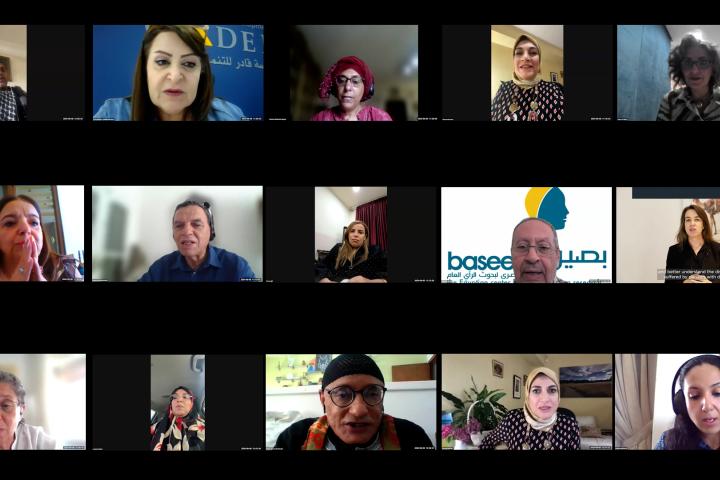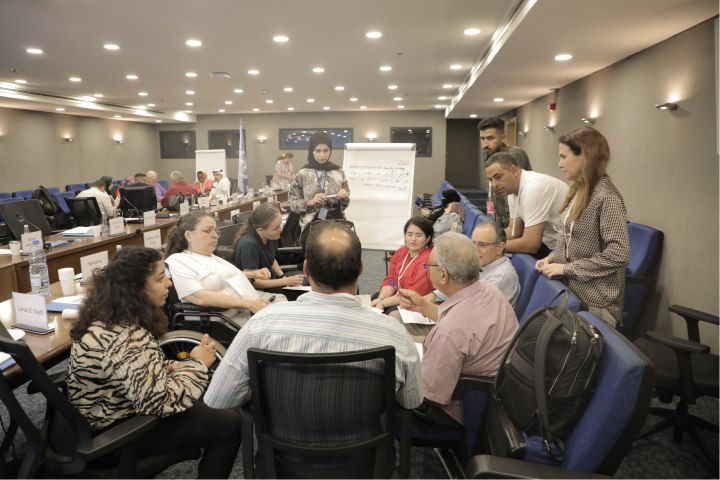The second panel of the 28th ministerial session of the United Nations Economic and Social Commission for Western Asia (ESCWA) convened this afternoon to discuss the topic “Economic policies in support of social justice”, examining the connections between economics and social justice, and the impact of various economic and fiscal policies on social and economic development from an equity and justice perspective.
Participants discussed the role of economic policy in supporting social justice in terms of combating poverty and income inequality; creating employment opportunities; improving education and health services; and providing funding for social justice schemes. The aim of the discussions was to exchange lessons learned among Arab leaders and prominent regional and international thinkers on the relationship between economic policies, social justice and sustainable development, so as to develop concrete proposals and policy options that can be incorporated into national and regional development plans. The panel focused on the following two issues: ensuring equality in development by guaranteeing health-care services, social protection, poverty reduction and avenues for participation; and enhancing fiscal space for development expenditure through subsidy and tax reforms.
Over the past decades, the region's economic performance has been commendable, but it did little to rectify the multiple social, economic and political injustices in Arab societies, mainly resulting from a dysfunctional welfare State model and a short-sighted growth-focused socioeconomic approach, which overlooked sustainable development and its prerequisites, namely equality, equity, rights and participation.
The Arab region is the only developing region that has not reduced poverty, despite an average annual per capita income growth of around 2 per cent since the 1990s. Extreme poverty in the least developed Arab countries reached 21.6 per cent in 2012 and poverty has recently increased in many countries because of political instability and conflict. In addition, employment in the agricultural sector has declined by nearly 20 per cent since the 1990s because of limited agricultural development, owing to land and water constraints, thus exacerbating urban-rural inequality. Consequently, in 2010, the unemployment rate in the Arab region reached 13 per cent, one of the highest rates in the world, further increasing to 14.4 per cent during the uprisings. Only 26 per cent of women in the Arab region are employed compared to a world average of 51 per cent, and youth unemployment is at a striking 23.3 per cent compared to a world average of 13.9 per cent. It is estimated that middle and low income Arab countries must produce 92 million jobs by 2030 to reach full employment and raise women’s labour force participation rate to 35 per cent. Participants noted that most Arab countries heavily subsidize their energy. Around 50-85 per cent of public spending is allocated to subsidies, amounting to 3-14 per cent of gross domestic product (GDP). Such expenditure greatly exceeds amounts dedicated to other development needs and has proven to be an inefficient and ineffective pro-poor measure, given that its benefits are mostly enjoyed by wealthier population groups.
The 28th ministerial session of ESCWA, held at the Regency Hotel in Tunis, will close on Thursday, 18 September 2014. The participation of many Arab leaders and policymakers, despite the difficult conditions affecting the region, reflects their commitment to building new development models founded on social justice; a value enshrined in Arab-Islamic culture and a key demand of the popular uprisings.
****
For more information, please visit: http://www.escwa.un.org/about/gov/sessions/maine.asp?lang=e&ID=173 Or contact: ESCWA Communication and Information Unit (ECIU): +961-70-993144/76-046402/ 03-910 930 dargham@un.org, abi-zaki@un.org, sleiman2@un.org, escwa-ciu@un.org United Nations Information Centre-Tunis: +216-71902203/71906615 +216-22-487247/+216-20-300110 kaouther.bizani@unic.org, bizani@un.org, samia.sfar@unic.org, sfar@un.org



